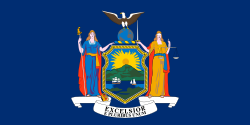| Image | Attorney general | Tenure | Party | Notes |
|---|
 | Egbert Benson | May 8, 1777 – May 14, 1788 | | |
 | Richard Varick | May 14, 1788 – September 29, 1789 | Federalist | |
 | Aaron Burr | September 29, 1789 – November 8, 1791 | Dem.-Rep. | Third vice president of the United States |
 | Morgan Lewis | November 8, 1791 – December 24, 1792 | Dem.-Rep. | |
 | Nathaniel Lawrence | December 24, 1792 – November 13, 1795 | Dem.-Rep. | |
 | Josiah Ogden Hoffman | November 13, 1795 – February 3, 1802 | Federalist | |
 | Ambrose Spencer | February 3, 1802 – February 3, 1804 | Dem.-Rep. | |
| John Woodworth | February 3, 1804 – March 18, 1808 | Dem.-Rep. | |
| Matthias B. Hildreth | March 18, 1808 – February 2, 1810 | Dem.-Rep. | |
 | Abraham Van Vechten | February 2, 1810 – February 1, 1811 | Federalist | |
| Matthias B. Hildreth | February 1, 1811 – July 11, 1812 | Dem.-Rep. | Died in office |
 | Thomas Addis Emmet | August 12, 1812 – February 13, 1813 | Dem.-Rep. | |
 | Abraham Van Vechten | February 13, 1813 – February 17, 1815 | Federalist | |
 | Martin Van Buren | February 17, 1815 – July 8, 1819 | Dem.-Rep. | Eighth president of the United States |
 | Thomas Jackson Oakley | July 8, 1819 – February 12, 1821 | Federalist | |
| Samuel A. Talcott | February 12, 1821 – January 27, 1829 | Dem.-Rep. | First appointed, in 1823 elected by State Legislature, resigned shortly before the end of his second term |
 | Greene C. Bronson | January 27, 1829 – January 12, 1836 | Democratic | Elected a justice of the State Supreme Court during his third term |
 | Samuel Beardsley | January 12, 1836 – February 4, 1839 | Democratic | |
| Willis Hall | February 4, 1839 – February 7, 1842 | Whig | |
 | George P. Barker | February 7, 1842 – February 3, 1845 | Democratic | |
 | John Van Buren | February 3, 1845 – January 1, 1848 | Democratic | Legislated out of office by the Constitution of 1846 |
 | Ambrose L. Jordan | January 1, 1848 – December 31, 1849 | Whig | First attorney general elected by general ballot |
| Levi S. Chatfield | January 1, 1850 – November 23, 1853 | Democratic | Resigned shortly before the end of his second term |
 | Gardner Stow | December 8, 1853 – December 31, 1853 | Democratic | Appointed to fill the unexpired term |
 | Ogden Hoffman | January 1, 1854 – December 31, 1855 | Whig | |
| Stephen B. Cushing | January 1, 1856 – December 31, 1857 | American | |
 | Lyman Tremain | January 1, 1858 – December 31, 1859 | Democratic | |
 | Charles G. Myers | January 1, 1860 – December 31, 1861 | Republican | |
 | Daniel S. Dickinson | January 1, 1862 – December 31, 1863 | Union | |
 | John Cochrane | January 1, 1864 – December 31, 1865 | Union | |
 | John H. Martindale | January 1, 1866 – December 31, 1867 | Republican | |
 | Marshall B. Champlain | January 1, 1868 – December 31, 1871 | Democratic | Two terms |
 | Francis C. Barlow | January 1, 1872 – December 31, 1873 | Republican | |
 | Daniel Pratt | January 1, 1874 – December 31, 1875 | Democratic | |
 | Charles S. Fairchild | January 1, 1876 – December 31, 1877 | Democratic | |
 | Augustus Schoonmaker Jr. | January 1, 1878 – December 31, 1879 | Democratic | |
 | Hamilton Ward Sr. | January 1, 1880 – December 31, 1881 | Republican | |
 | Leslie W. Russell | January 1, 1882 – December 31, 1883 | Republican | |
 | Denis O'Brien | January 1, 1884 – December 31, 1887 | Democratic | Two terms |
 | Charles F. Tabor | January 1, 1888 – December 31, 1891 | Democratic | Two terms |
 | Simon W. Rosendale | January 1, 1892 – December 31, 1893 | Democratic | |
 | Theodore E. Hancock | January 1, 1894 – December 31, 1898 | Republican | Two terms (1894–1895; 1896–1898) |
 | John C. Davies | January 1, 1899 – December 31, 1902 | Republican | Two terms |
 | John Cunneen | January 1, 1903 – December 31, 1904 | Democratic | |
 | Julius M. Mayer | January 1, 1905 – December 31, 1906 | Republican | |
 | William S. Jackson | January 1, 1907 – December 31, 1908 | Democratic | |
 | Edward R. O'Malley | January 1, 1909 – December 31, 1910 | Republican | |
 | Thomas Carmody | January 1, 1911 – September 2, 1914 | Democratic | Resigned shortly before the end of his second term |
 | James A. Parsons | September 2, 1914 – December 31, 1914 | Democratic | Appointed to fill the unexpired term |
 | Egburt E. Woodbury | January 1, 1915 – April 19, 1917 | Republican | Resigned during his second term |
 | Merton E. Lewis | April 19, 1917 – December 31, 1918 | Republican | As first deputy AG acted until being elected by the State Legislature on April 25 to fill unexpired first half of term, then re-elected in special election (Nov. 1917) for the other half (1918) |
 | Charles D. Newton | January 1, 1919 – December 31, 1922 | Republican | Two terms |
 | Carl Sherman | January 1, 1923 – December 31, 1924 | Democratic | Defeated for reelection in 1924 |
 | Albert Ottinger | January 1, 1925 – December 31, 1928 | Republican | Two terms; unsuccessful Republican nominee for governor in 1928 |
 | Hamilton Ward Jr. | January 1, 1929 – December 31, 1930 | Republican | Son of Hamilton Ward Sr. (AG from 1880 to 1881) |
 | John J. Bennett Jr. | January 1, 1931 – December 31, 1942 | Democratic | Five terms |
 | Nathaniel L. Goldstein | January 1, 1943 – December 31, 1954 | Republican | Three terms |
 | Jacob K. Javits | January 1, 1955 – January 9, 1957 | Republican | Resigned having been elected U.S. senator |
 | Louis J. Lefkowitz | January 9, 1957 – December 31, 1978 | Republican | Re-elected by the State Legislature to fill the unexpired term, then re-elected to five more terms, longest-serving attorney general (8 days short of 22 years) |
 | Robert Abrams | January 1, 1979 – December 31, 1993 | Democratic | Elected to four terms, resigning a year before the end of his fourth term |
 | G. Oliver Koppell | January 1, 1994 – December 31, 1994 | Democratic | Elected by the State Legislature to fill unexpired term |
 | Dennis Vacco | January 1, 1995 – December 31, 1998 | Republican | Defeated for reelection in 1998. Joined Waste Management, Inc. as vice president for New York government affairs. Became a partner in Buffalo law firm, Lippes Mathias Wexler Friedman. |
 | Eliot Spitzer | January 1, 1999 – December 31, 2006 | Democratic | Two terms, then elected governor |
 | Andrew Cuomo | January 1, 2007 – December 31, 2010 | Democratic | One term, then elected governor |
 | Eric Schneiderman | January 1, 2011 – May 8, 2018 | Democratic | Resigned during his second term |
| Barbara D. Underwood | May 8, 2018 – December 31, 2018 | Democratic | Served as acting attorney general from May 8 to May 22, when she was confirmed by the New York State Legislature. |
 | Letitia "Tish" James | January 1, 2019 – present | Democratic | |

































































